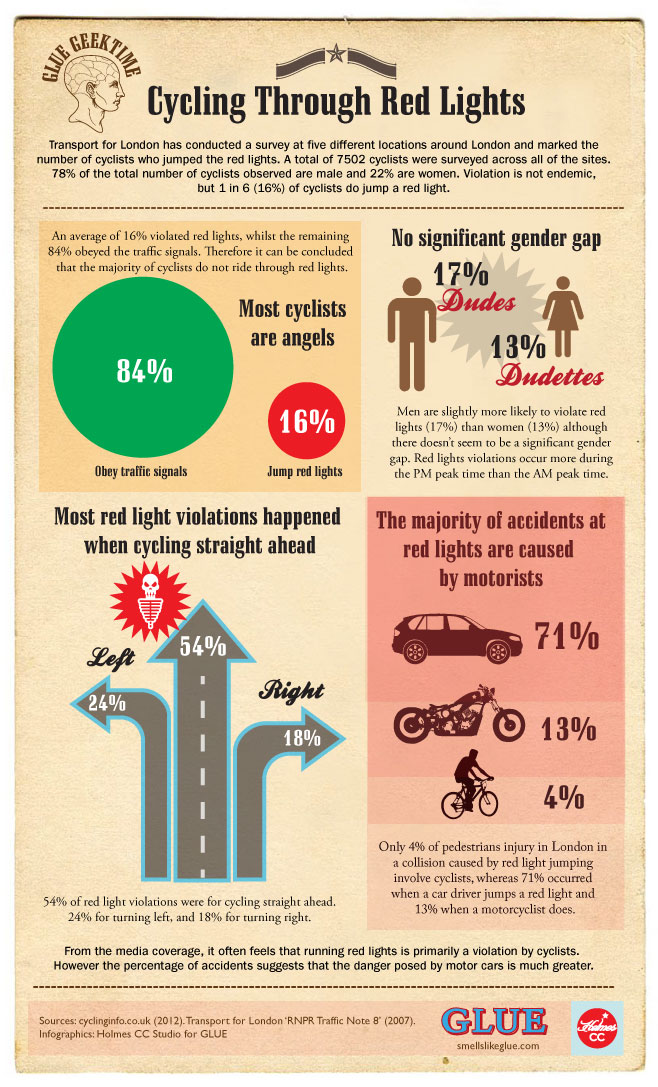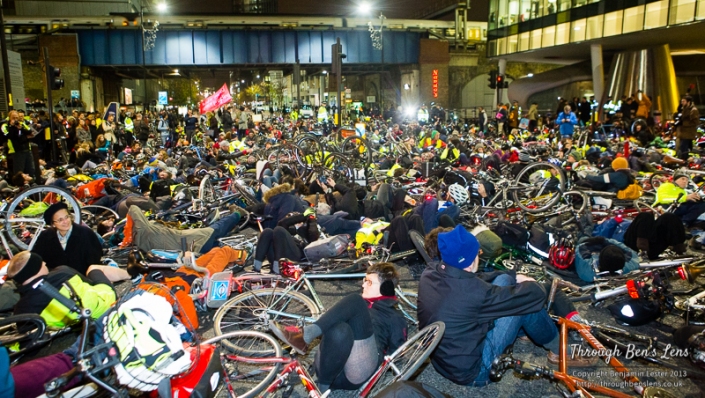cycling
Dutch People on Bikes
Video Posted on
People in The Netherlands who ride bikes aren’t typically the same breed as the ‘cyclists’ of the UK; they’re just ordinary people who happen to ride bikes because it makes the most sense.
This short video contains some really rather ordinary footage of people riding bikes in Amsterdam. However, the video quality, editing, and backing music are all superb. Oh, and the fact that there is hardly a car in sight, that’s also superb.
Hitler the Road Nazi
Video Posted on Updated on
Hitler rants about bicycles and reacts to Premier Ted Baillieu’s recent remarks that the registration of bicycles is not feasible.
Nikki Sinclaire (West Midlands European parliamentarian) has echoed Hitler’s sentiment in calling for compulsory cycle registration and helmet use.
Cycle registration is a contentious issue, but to me it seems absurd for anyone to seriously suggest erecting such significant barriers to cycling at a time when there are too many cars on the roads and the nation’s health is so poor.
Some politicians seem to be under the impression that cyclists are anarchists who disregard the rules and their own safety for no particular reason. Although I don’t condone red-light jumping and pavement cycling (two of the most controversial issues), there are strong arguments and hard data in support of the fact that such behaviours are sometimes justified in light of their being the safest options at certain junctions. This being the case, what is perceived as the ‘bad behaviour’ of cyclists is symptomatic of the poor conditions that British bike riders have to put up; not only do we lack the strict liability laws employed to protect vulnerable road users across Europe, but our cycling infrastructure amounts to little more than inconsistent and unenforced dabs of paint.
If politicians like Nikki Sinclaire want people on bikes to behave better then maybe they should spend more time learning about how successful cycling cultures work and less time proposing preposterous new rules that do nothing to protect cyclists whatsoever.
Advice Mallard for Cyclists
Image Posted on

In my 15 years of cycling on the roads, this single piece of advice has kept me better protected than any helmet or hi-viz vest.
–
(For those who are not familiar with this meme, this is the ‘actual advice mallard’ who dispenses useful advice and life-tips. Not to be confused with his cousin, the malicious/bad advice mallard.)
Red Light Jumpers in London
Image Posted on Updated on
TfL gathered some data about red light jumping cyclists in London.
This data has been dug up from the 2012 archives possibly in response to the recent hidden-camera footage of cyclists jumping reds (http://www.standard.co.uk/news/london/cyclists-filmed-jumping-red-lights-in-london-taxi-drivers-hidden-camera-footage-8969043.html)
While heavily-edited footage gathered by disgruntled taxi drivers hardly constitutes scientific evidence, it remains true that cyclists in London need to clean up their act if they want to maintain the moral high ground and support their case for decent infrastructure.
The following video illustrates some related issues:
Related articles
- ‘More than half’ of cyclists jump red lights (london24.com)
- Cyclists caught jumping red lights in London taxi drivers’ hidden camera footage (standard.co.uk)
- London Cyclists stage mass ‘die-in’ (dutchbikeguy.wordpress.com)
Dinosaur MPs on Britain’s Transport Committee
Link Posted on Updated on
Dinosaur MPs on Britain’s Transport Committee
For the many of you fortunate enough to not view the committee’s near two-hour session about cycle safety on Monday afternoon, I can tell you that there are scarcely enough words to describe how disheartening and shambolic it was. To give you a flavour of one journalist’s reaction, follow this link to see a collation of running tweets from the event.
The session followed the recent deaths of six cyclists in London and saw the 11-member committee first quiz a series of cycling representatives and police, then a trio of bigwigs from the road haulage world, along with Andrew Gilligan, cycle adviser to London’s mayor, Boris Johnson, and an expert from the Transport Research Laboratory.
For the most-part, it seemed as if the MPs were concerned with minor issues. For instance, Sarah Champion (Labour MP) wondered whether helmet use could be made compulsory. How a bike helmet is supposed to help someone crushed by an HGV is something that we might wonder in response… The headphones issue was also raised.
Following this, Jason McCartney (Tory MP) asked if there was a war going on between cars and bikes. His party colleague, Martin Vickers, then asked – and he was being entirely serious – if the panel felt cyclists should “contribute” financially to the upkeep of roads. Yes, that’s right. The road tax question, the litmus test for someone who not only doesn’t understand the very basics about cycling policy but hasn’t the barest minimum of intellectual curiosity about it. Silly enough in a pub conversation. For an MP, let alone an MP on the transport select committee, let alone an MP on the transport select committee discussing cycling, it’s unforgivable.
An extract from a Guardian article on the subject encapsulates some real truths about how cycling issues are addressed by the people in power:
“…when it comes to cycling policy in Britain, we remain, for the most part, in the age of the dinosaur. The odd politician talks an occasional good game on bikes, but look at too many mainstream MPs and we’re right back in the 1960s, where bikes are a toy, or a faddish “pursuit”, perilous and mistrusted, while all must lie down in homage to “the economy”, a narrowly-defined set of interests with motorised pistons beating at their heart.”
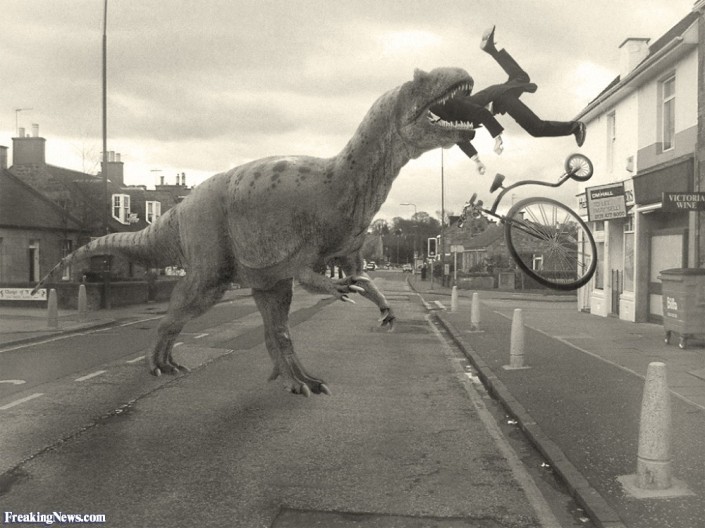
Jim Dobbin (Labour MP) then proceeded to regale the committee with a series of anecdotes about misbehaving cyclists and scratched car paintwork before suggesting that currently cycle safety woes could be addressed by requiring cyclists to register themselves and their bikes, and to pass proficiency tests in order to gain a cycling licence.
Although many people may believe that Dobbin’s prescription is a good one, it is worth remembering that not a single country on this planet implements these things for the simple reason that they massively curtail bicycle use. Bicycles don’t have the capacity to be the killing machines that cars and lorries sometimes are, and cyclists don’t produce CO2 or damage the roads to the same degree as motor vehicles; requiring them to be registered and licensed (presumable at some cost) seems a preposterous and misguided contribution to a meeting about cycle safety. And while cycling proficiency is a reasonable issue, no one at the committee meeting seemed aware of the bikeability scheme.
Part two was possibly even more depressing still. The MPs, who had been quite interrogative towards the cycle groups (albeit mainly on irrelevancies) gave the haulage group representatives a far easier time. Jack Semple, policy head of the Road Haulage Association, was left utterly unchallenged when he repeatedly singled out cyclist behaviour as the reason for them being killed by lorries; an assertion for which there is, as far as I understand, no evidence.
What was missing from the committee meeting was an acknowledgement of the fact that cities are changing places. Whereas once they competed on things like skyscrapers and parking spaces, the most desirable cities in the world are now places where there is an emphasis on liveability – a more human-centred approach. People don’t want to live with urban motorways and the noise, congestion, and pollution that they bring with them. The nicest cities are more pedestrianised, with pavement cafes, and safe, communal spaces. They also prioritise (and even incentivise) walking and cycling in such a way as to make them more convenient than driving (just look at Groningen in The Netherlands for the perfect example).
To illustrate this point, it is worth noting that there are three big annual lists of the world’s most liveable cities. Not one of them features anywhere in the UK.
Things clearly need to change, and the mass extinction of political dinosaurs seems to be a necessary first step.
London Cyclists stage mass ‘die-in’
Following the recent deaths on London’s busy streets, cyclists in the capital held a vigil and protest outside the headquarters of TfL (Transport for London). Despite the cold we lay down next to our bikes and made a pretty bold statement that TfL can no longer ignore.
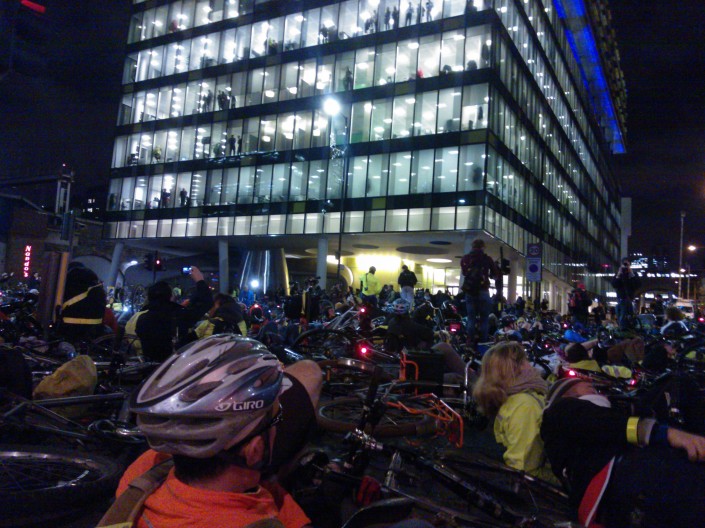
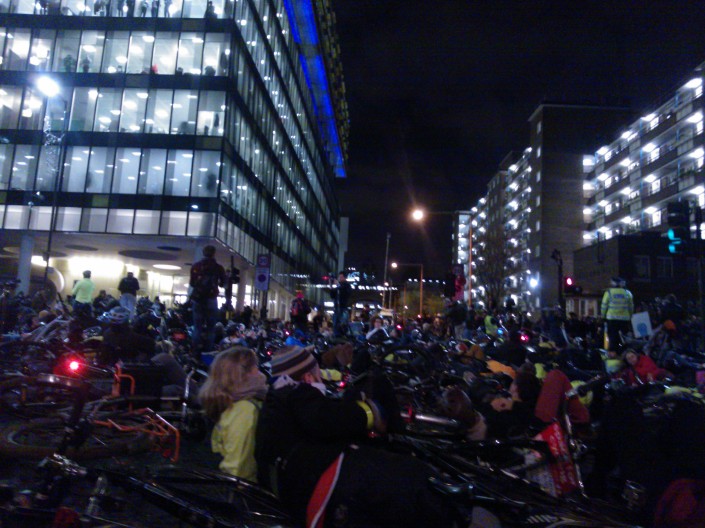
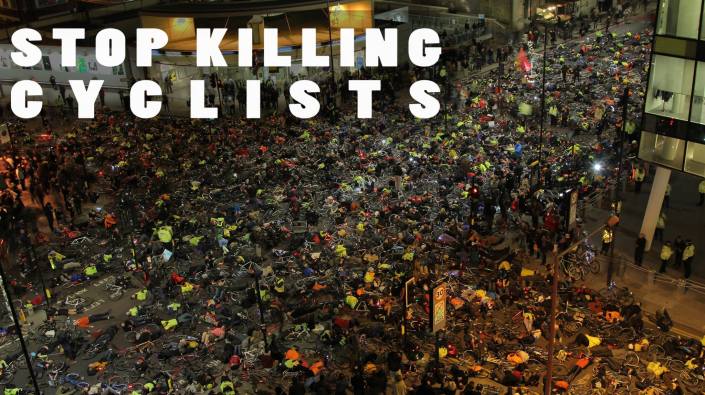
London’s die-in was reminiscent of the famous Dutch die-in that took place in the 1970s on the museumplein outside the Rijksmuseum.
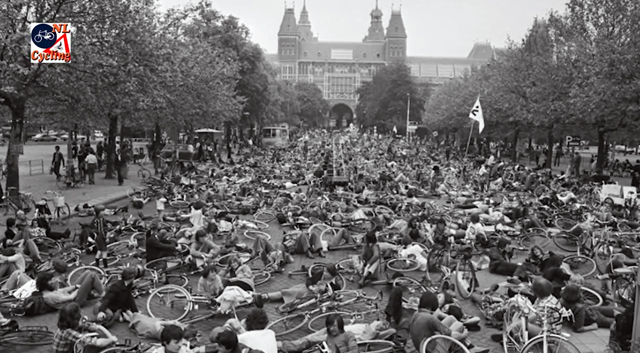
The Dutch campaign was motivated by the number of people (particularly children) who were dying on the roads. Their protest achieved remarkable things in terms of their infrastructure, and 40 years down the line they are still reaping the benefits.
Dutch solutions to London’s problems aren’t really so radical, and their implementation would only requires a modest degree of commitment from the government.
Look at how they deal with HGVs and roundabouts – surely this sort of infrastructure is desirable for everyone, no?
On a side note, my sister was interviewed by the BBC during the protest, and her vox-pop even made it onto the evening news! I will try to upload a video, if I can find one…

And the BBCs coverage of the event (my sister at 1:04)…
and another one…
Related articles
- Cyclists lie outside Transport for London (TfL) headquarters to protest road deaths (express.co.uk)
- Thousands of cyclists lie down in the road for rush hour protest outside TfL’s Blackfriars HQ (standard.co.uk)
- http://www.huffingtonpost.co.uk/2013/11/29/stop-killing-cyclists_n_4361265.html?utm_hp_ref=uk
- http://www.bbc.co.uk/news/uk-england-london-25160874
- http://www.cyclingweekly.co.uk/news/latest/541453/cyclists-stage-mass-die-in-outside-transport-for-london-offices.html
Dutchman isn’t impressed by London’s cycling infrastructure
Video Posted on Updated on
A brief analysis of cycling conditions in London from David Hembrow.
As a Dutchman, Hembrow highlights the shortcomings of British infrastructure that we have to live with. He makes the point that not only are the roads inadequate for cyclists, but that they aren’t really serving motorists much better either.
More than anything else, the thing that really struck me about this video was the shear volume of noise coming from the road. Motor vehicles make the urban environment a really unpleasant place to be.
Another video that focuses specifically on the shortcomings of London’s CS2 can be found here
Related articles
- London’s ‘cycling superhighways’ are ideal … for kamikazes | Charles Montgomery (theguardian.com)
- Cycle deaths leave London bewildered (bbc.co.uk)
- Upgrade London’s CS2 to Continental Standards – call to arms (dutchbikeguy.wordpress.com)
John Snow calls for improvements in cycling infrastructure
Video Posted on Updated on
http://www.bbc.co.uk/news/uk-politics-25046751
Veteran journalist John Snow is also an avid cyclist.
He has commuted by bike both to and from work every day for the last 40-odd years, and he raises some valid points about the dangers of riding a bike and the inadequacy of cycle safety provisions.
He talks about the probability of ‘big rewards’ for the first politician to re-draw the urban map and prioritise cyclists and pedestrians. In terms of combating obesity, reducing pollution, and making our cities more pleasant places to live, I think I can see why such a measure would be well received.
He states that, as humans, we respond to our surroundings. On the issue of cyclists who flout the law, the point he makes is that good behaviour will come when there are good provisions to protect and facilitate cycling. At the moment, it is a dog-eat-dog world out there on the roads; as the underdogs, cyclists are therefore put in a position of vulnerability, and have to make the most of their situation. Snow doesn’t condone bad behaviour on the roads, but he can at least appreciate why it happens.
Also of interest: http://www.bbc.co.uk/news/uk-25013438 and http://www.bbc.co.uk/news/uk-25014296
Related articles
- VIDEO: Snow’s verdict on dangers of cycling (bbc.co.uk)
- Cycling policy ‘getting better’ (bbc.co.uk)
Cycling as Key to Happy Cities
Link Posted on Updated on
Cycling as Key to Happy Cities
“In the third year of his term, Peñalosa challenged Bogotáns to participate in an experiment. As of dawn on 24 February 2000, cars were banned from streets for the day. It was the first day in four years that nobody was killed in traffic. Hospital admissions fell by almost a third. The toxic haze over the city thinned.”
Great article from The Guardian on the happiness that cycling can bring to a society. I would love for the UK to experiment with some car-free days in our cities, just so people can see how preferable it is. We’d need some more visionary leaders for that to happen though…

Researchers for Hewlett-Packard convinced volunteers in England to wear electrode caps during their commutes and found that whether they were driving or taking the train, peak-hour travellers suffered worse stress than fighter pilots or riot police facing mobs of angry protesters.
Related articles
- Ban lorries from cities, says Boardman, as sixth cyclist dies (thetimes.co.uk)
- Evening Standard comment: London needs a fresh approach to cycling (standard.co.uk)
- Cycling to work popularity revealed (standard.co.uk)
- VIDEO: Views on London Cycle Superhighways (bbc.co.uk)
- VIDEO: Inside a robotic cycle park (bbc.co.uk)
- Cycling = Happiness (alternativemiddleclass.com)
Strict Liability Laws in Scotland – let’s catch-up with Europe!
For those who don’t know what strict liability laws are or how they work, I recommend the following (short) video: http://www.youtube.com/watch?v=4_Bq1vxCUvo
The reason why I raise this issue now is that Members of the Scottish Parliament (MSPs) will debate the introduction of strict liability laws on the 29th of October. In advance of this debate, I contacted all the MSPs whose addresses I could get my hands on in order to outline my reasons for supporting the introduction of these laws and to urge them to attend the debate. Although some of the replies that I received (i.e. from Green/Labour MSPs) were resoundingly positive and supportive of the motion, the reply that I received from Gavin Brown (of the Conservative Party) came across as rather unsubstantiated in its opposition to the introduction of strict liability laws (but perhaps that’s just my prejudice speaking…). Have a look for yourself:
“Dear Mr Walton
Needless to say, I replied to Mr. Brown inviting him to expand on what exactly the Scottish Conservatives foresee as being the “adverse and unintended consequences” associated with a motion designed to protect the most vulnerable road users. I inform him that, as a cyclist who has been on the roads of Europe for 15 years, I am keen to hear about how such policies will have negative consequences that significantly outweigh the positive ones, and also curious as to why he thinks that these negative consequences (such as the emergence of a ‘compensation culture’) will apply to Scotland even though they don’t seem to manifest themselves on the Continent (where strict liability laws are the norm).
.
I also question Mr. Brown’s reliance on the soothsaying abilities of the Conservative party, and recommend that he just looks across the channel to learn about how these laws work in the numerous countries that have already adopted and maintained in virtue of their efficacy and general desirability. I inform him that, apart from the UK, only Cyprus, Malta, Romania, and Ireland do not operate a system of strict liability for road users, and I further suggest that his opposition to these laws actually maintains barriers to cycling that go against his supposed commitment to the promotion of cycling. I share with him my experience of cycling in Amsterdam, and explain how the psychological effect of these laws changes the way that motorists perceive people on bikes, ultimately providing vulnerable road users with an invisible but highly effective form of protection.
And lastly, I encourage Mr. Brown to give up his car and instead try riding a bike for a month so that he can learn first-hand what it is like to feel vulnerable and disrespected on the roads. I implore him to do this in the hope that the insight he gains in that short time will be more than enough to change his mind.
If you would also like to write to your MSPs to encourage them to attend the debate and vote in favour of strict liability laws, please visit the Cycle Law Scotland page: http://www.cycling-accident-compensation.co.uk/parliamentary-debate.aspx
See BBC coverage here: http://www.bbc.co.uk/news/uk-scotland-22155209
Also of relevance from the BBC: http://www.bbc.co.uk/news/uk-scotland-21366881
and: http://www.bbc.co.uk/news/uk-scotland-edinburgh-east-fife-20302932

